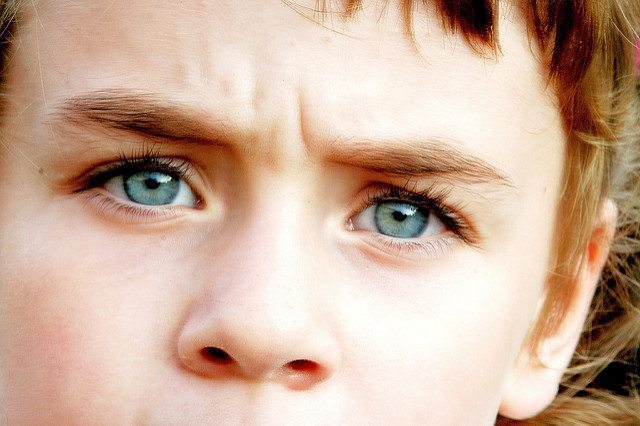Talking to Your Child About Violence
By: Other | March 9, 2018

Written by Anke Reineke, Ph.D.
In the past weeks we have seen and heard a lot about violence in school. Such violence has an impact beyond the place where it happened. Violence in our world today is all around our kids, in the media, in our communities, and even in our schools.
Our kids are exposed to unavoidable images and stories that can be very frightening for them. It is important to realize that your child understands more than you may think. If they see or hear about violent acts, they need you to provide guidance and information to ease their fears. Having children myself, I have been asked many questions in recent weeks and seen the shock, fear, sadness, and confusion in my children’s faces. These reactions are temporary and lessen over time, but some may lead to what is called childhood trauma.
Nearly 35 million children have experienced at least one event that could lead to childhood trauma (Child and Adolescent, 2012). About 72% of children in the United States will have experienced at least one stressful event before the age of 18. Such stressful events include witnessing or being a victim of violence, experiencing sexual, physical, or emotional abuse, suffering a serious injury or medical condition, enduring the death of a parent or sibling (Deryck, Silver, & Prause, 2014).
If your child has any of the following symptoms or if your child’s ability to participate in normal activities, or if significant changes are noted, you should seek a mental health professional.
- General lack of energy or lack of interest in previously enjoyed activities
- Increased misbehavior, lashing out against family members, refusal to participate in normal family routines
- Decline in school performance, school avoidance, or difficulty concentrating
- Physical complaints with no apparent cause
- Repetitive play re-enacting the traumatic events
- Sleeping difficulties such as falling or staying asleep or repeated nightmares
- Increased arousal, easy startling, quick to anger, agitation, irritability, aggressiveness
- Regression in behavior such as bedwetting, clinginess, fear of the dark
If your child does not have any of the above symptoms, the best thing to do to help our children cope is to be available to talk. Be honest with your children and give them accurate information appropriate for their developmental level. Here are some tips from the National School Association of School Psychologists to help you help your kids in coping with violence.
Encourage Your Kids to Talk About What They See and Hear
- Tune in to your child’s feelings and encourage them to discuss what they’ve seen and heard.
- You might initiate a conversation by saying “That TV show we watched seemed pretty scary to me. What did you think?” or “How do you feel after watching so many people get injured? I feel sorry for them. What about you?” See where the conversation leads.
Your kids will feel better when they talk about their feelings. It lifts the burden of facing fears on their own.
- If your child feels depressed or angry, it is very important to reassure them that you love them. Allow them to talk about their worries.
- Find out what your kids have heard at school or in the news. If needed, give them factual information to dispel any misconceptions.
- Give information at age-appropriate levels and put events into context. Explain that even though frightening things can happen, most people go about their day without harm.
Limit Exposure to Violence
Research shows that children who watch a lot of violence on TV, in movies or video games feel less safe than those who don’t. Watching violence can desensitize them to violence.
- Be involved with your kids and talk about the things you see together. For example, remind your kids that the heroes they see on TV, such as Superman or Batman, are acting a part. If they acted that way in real life, they would end up in big trouble.
- Let your child know your values. Say, for example, “Violence just isn’t funny to me. I know that games and movies are not real, but when people get seriously hurt in real life it is terribly sad for everyone involved.” Watching the news and movies together provides opportunities to reinforce the consequences of violence.
Reassure Your Child
Kids who see or hear about violent acts can become anxious and fearful that similar acts may happen to them or loved ones.
- Reassure your children by telling them they are safe. Say that lots of people are here to watch them. You can reassure them by suggesting what to do if they ever feel unsafe when away from home, such as going to a trusted adult, teacher, or family friend.
- Remind them that they can always tell you when they are afraid in any situation. Talk about the police and the fantastic job they do at dealing with these problems and keeping the community safe.
- Provide a consistent and supportive environment to help reduce your kid’s fears and anxieties.
Educate Your Kids
- Give them options and prepare them for what to do in situations where they feel unsafe. For example, if they see a gun at a friend’s place or at school, instruct them NEVER to touch it but just walk away. Telling an adult right away will keep them and their friends safe.
- Remind your kids that they never have to handle these situations on their own. You are there for them as support.
Seek Support
- If you feel that you need more information and help, seek support from a mental health professional or other community members such as teachers.
At the end of the day, I hug my kids and remind them that there millions of people who do good things in this world. I recommend that you read them one of my favorite books entitled Good People Everywhere by Lynea Gillen.
Image: McBeth on flickr and reproduced under Creative Commons 2.0



